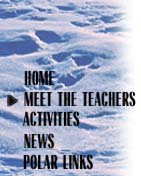22 April, 2003
What is TEK?
Today in Kotzebue
Considering that we have to go 30 miles across the sound on snow
machines on Thursday, it is getting a little warm and mushy for our
taste. We would like to see a good solid freeze.
What science is happening?
Terry Reynolds, a graduate student on our team living in Kotzebue,
and Martha Whiting, a native Inupiaq woman, who has spent her life in
Kotzebue talked on our conference call today. We discussed Traditional
Ecological Knowledge (TEK), that is knowledge gathered by native people
that has helped them survive and thrive in a very inhospitable land for
thousands of years. Martha talked about native medicines, changes in
the village and differences in the animal populations that she has
noticed in her life. She was also able to talk about the subsistence
lifestyle* that the Inupiaq people lead.
Terry was able to talk about the scientific value of traditional
knowledge and methods of interviewing and obtaining TEK data.
Classroom Connections:
Why do you think that traditional knowledge is important?
What is traditional knowledge based on?
What source in your
community do you have for traditional knowledge?
What do you
think you could learn?
Reflections
One of the things
I requested, when I asked for an assignment, was to work with other
cultures. This has been fascinating and very rewarding. Lisa and I
went to Alex and Martha Whitings’ house. I was able to see the room
where Alex keeps all the furs he has hunted. His family eats the meat,
shares with elders, uses the skins in crafts and trades them. Inupiaq
people are allowed to hunt to feed their families (subsistence) but are
not allowed to hunt for profit. We were fortunate to get an invitation
to dinner, which was a new twist on an old favorite, caribou burritos.
Yum!
Words to know
Subsistence living- Most people have
regular jobs but take time off during different seasons to go hunting
to feed there families. Subsistence families will share their catch
with the community, parcticularly elders who are unable to hunt.
Links
Learn
more about our project here
View curriculum for this project, “Ask a Scientist” and
learn about other Arctic Real Time research at Arctic Alive
City of
Kotzebue Webpage
Listen to the local radio station KOTZ live

Martha Whiting, a native Inupiaq woman who has lived most of her life in Kozebue. She gave a conference call interview about traditional ecological knowledge

Terry Reynolds, a member of our team working on interviewing Inupiaq Elders and others to learn about TEK
Contact the TEA in the field at
.
If you cannot connect through your browser, copy the
TEA's e-mail address in the "To:" line of
your favorite e-mail package.
|






